Related Research Articles

Benue–Congo is a major branch of the Volta-Congo languages which covers most of Sub-Saharan Africa.
Igboid languages constitute a branch of the Volta–Niger language family.

Roger Marsh Blench is a British linguist, ethnomusicologist and development anthropologist. He has an M.A. and a Ph.D. from the University of Cambridge and is based in Cambridge, England. He researches, publishes, and works as a consultant.
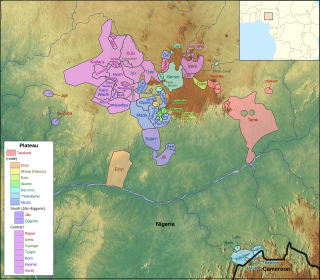
The forty or so Plateau languages are a tentative group of Benue–Congo languages spoken by 15 million people on the Jos Plateau, Southern Kaduna, Nasarawa State and in adjacent areas in central Nigeria.
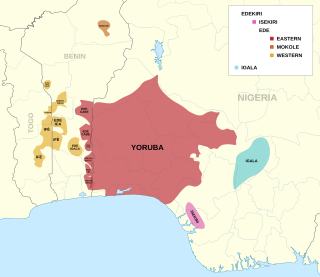
Yoruboid is a language family composed of the Igala group of dialects spoken in south central Nigeria, and the Edekiri group spoken in a band across Togo, Ghana, Benin and southern Nigeria, including the Itsekiri of Warri Kingdom.

There are over 525 native languages spoken in Nigeria. The official language and most widely spoken lingua franca is English, which was the language of Colonial Nigeria. Nigerian Pidgin – an English-based creole – is spoken by over 60 million people.

The North Bauchi languages are a branch of West Chadic languages that are spoken in Bauchi State, northern Nigeria.

The South Bauchi languages are a branch of West Chadic languages that are spoken in Bauchi State and Plateau State, Nigeria.
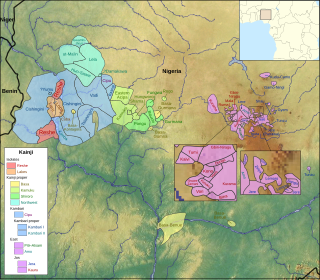
The Kainji languages are a group of about 60 related languages spoken in west-central Nigeria. They form part of the Central Nigerian (Platoid) branch of Benue–Congo.
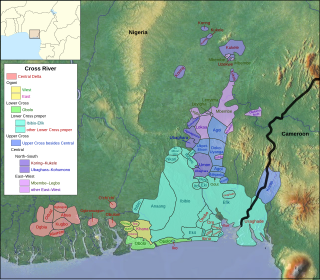
The Cross River or Delta–Cross languages are a branch of the Benue–Congo language family spoken in south-easternmost Nigeria, with some speakers in south-westernmost Cameroon. The branch was first formulated by Joseph Greenberg; it is one of the few of his branches of Niger–Congo that has withstood the test of time.
The Nupoid languages are a branch of Volta–Niger spoken in west-central Nigeria, particularly in southeastern Niger State and northern Kogi State. They include the Nupe, and Ebira languages, each with about 4 million speakers. Most Nupoid languages have 3 level tones.
The five Tarokoid languages are a branch of the Plateau family spoken in central Nigeria, just north of the middle reaches of the Benue River. Tarok itself has 300,000 speakers, with Pe and Sur about 5,000 each. Yangkam is severely endangered, being spoken by around fifty elderly men.
Ukaan is a poorly described Niger–Congo language or dialect cluster of uncertain affiliation. Roger Blench suspects, based on wordlists, that it might be closest to the (East) Benue–Congo languages. Blench (2012) states that "noun-classes and concord make it look Benue-Congo, but evidence is weak."
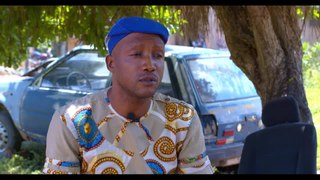
North Akoko, usually abbreviated as Akoko and also known as Arigidi, is a dialect cluster spoken in Nigeria. It appears to form a branch of the "Yoruba–Edo–Akoko–Igbo" group of Niger–Congo languages. It is spoken in the LGAs of Akoko North East, Akoko North West, Ekiti East, and Ijumu (Ethnologue).
The Lower Cross River languages form a branch of the Cross River languages of Cross River State, Nigeria. They consist of the divergent Obolo language, and the core of the branch, which includes the 4 million speakers of the Efik-Ibibio cluster.
The East Kainji languages are spoken in a compact area of the Jos Plateau in Nigeria, near Jos. There are more than 20 of them, most of which are poorly studied.
The Koma language is a language cluster belonging to the Duru branch of Savannas languages of Cameroon. Blench (2004) includes three varieties separated in Ethnologue, Koma Ndera, Gɨmne, and Gɨmnɨme; within Koma Ndera, speakers of the marginal dialects, Gomnome and Ndera, can scarcely understand one another, though both understand the central dialect, Gomme.
Ahwai, also called the Ndunic languages, is a Plateau language cluster spoken to the southwest of Fadan Karshi in Sanga LGA, Kaduna State, Nigeria. Most villages are located at the foot of the Ahwai Mountains in Kaduna State.
The Kamuku languages are a branch of the Kainji languages spoken by the Kamuku people of Niger State, western Nigeria, mostly in Mariga and Rafi LGAs.
Yangkam (Yankam), or Bashar (Basherawa), is a moribund Plateau language of Nigeria. It is located to the west of Bashar town in Plateau State.
References
- Blench, Roger and Kay Williamson. 2008. The Ogoni languages: comparative word list and historical reconstructions .
![]() This article incorporates text available under the CC BY 3.0 license.
This article incorporates text available under the CC BY 3.0 license.